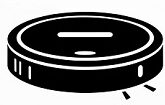If you’ve recently set up your Roomba, you might find yourself looking for an “on” button on its wall-mounted Home Base or docking station. This search often ends in confusion, as there is no physical power switch on the unit itself. This omission is not an oversight but a deliberate design choice by iRobot, intended to streamline the user experience and emphasize the device’s automated nature. The wall unit serves a very specific and crucial purpose, but direct activation is not one of them.
This article will demystify the function of the Roomba’s wall unit and explore the various modern methods you can use to start a cleaning cycle. We will delve into the design philosophy that guided this minimalist approach and provide a comprehensive troubleshooting guide for common activation issues. By the end, you will have a clear picture of how to operate your Roomba effectively and maintain it for long-lasting, reliable performance.
The Purpose of the Roomba Wall Unit

The wall unit, officially known as the Home Base, is the heart of your Roomba’s support system. Its primary role is to serve as a docking station and charging point. When the Roomba completes a cleaning cycle or its battery runs low, it automatically navigates back to the Home Base to recharge. This ensures the robotic vacuum is always powered up and ready for its next scheduled task. The wall unit’s intelligent charging management contributes to battery longevity and energy efficiency.
While you cannot start a cleaning cycle from the wall unit, you can still initiate one manually. To do this, simply place the Roomba on the docking station to ensure it has a connection, and then press the large “CLEAN” or “Start” button located prominently on the top of the robot itself. The real power of the Roomba, however, lies in its remote activation capabilities, which eliminate the need for physical interaction altogether.
How to Activate Your Roomba
iRobot has designed the Roomba ecosystem to be controlled through several convenient, remote methods. This focus on automation allows you to manage your home cleaning from anywhere, without ever needing to touch the device.
Using the iRobot Home App
The most powerful way to control your Roomba is through the iRobot Home app, available for both iOS and Android devices. Once connected to your Wi-Fi network, the app transforms your smartphone into a comprehensive command center. Through the app, you can:
* Start, pause, or cancel cleaning jobs from anywhere.
* Create detailed cleaning schedules for specific days and times.
* Monitor the Roomba’s status and cleaning progress.
* View cleaning history and maps.
* Customize cleaning preferences and settings.
With a Remote Control
Depending on the model, your Roomba may have come with a dedicated physical remote control. This provides a straightforward way to start and stop cleaning cycles without using the mobile app, offering a quick and convenient option for users who prefer a simple, tactile interface.
If your Roomba did not come with a remote, or if you’ve lost yours, a dedicated remote control can offer a convenient alternative to using your smartphone for basic commands.
Roomba Remote Control
iRobot 82204 Roomba Remote

Authentic remote for Roomba 500, 600, and 700 series models
New Replacement 82201 Remote Control
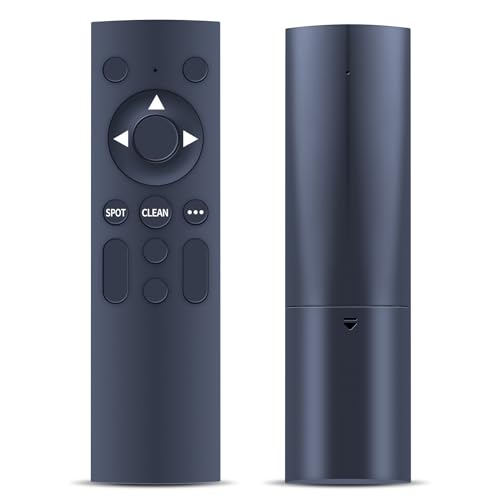
High-performance remote with fast response and long-distance control
PZL Replacement Remote Control
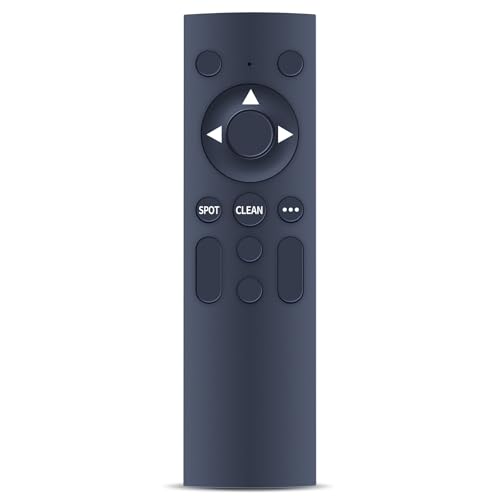
Durable and ergonomic remote with strong signal transmission
OYSTERBOY Replacement Remote Control
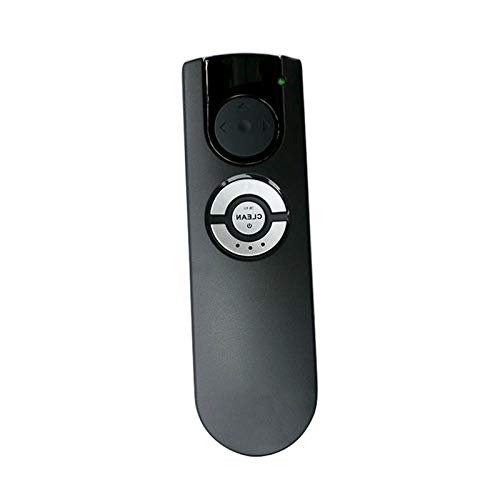
Simple and reliable remote for 500-800 series Roomba models
Through Voice Commands
For the ultimate hands-free experience, modern Roombas integrate seamlessly with popular smart home systems. By linking your iRobot account with Amazon Alexa or Google Assistant, you can activate your vacuum with a simple voice command. Phrases like, “Alexa, ask Roomba to start cleaning,” or “Hey Google, tell Roomba to vacuum” are all you need to get the job started.
Exploring iRobot’s Minimalist Design Philosophy
The decision to exclude a power button from the wall unit is a core element of iRobot’s design philosophy. The company aims to create an intuitive, simple, and clutter-free user experience. By removing unnecessary physical buttons from the docking station, iRobot emphasizes that the Roomba is a “set it and forget it” device.
This approach encourages users to embrace the automation features, such as scheduling cleanings via the app or initiating them with voice commands. The system is built around the idea that home cleaning should happen in the background, without requiring constant manual input. The clean, unobtrusive design of the Home Base allows it to blend into the home environment, serving its essential charging function without drawing attention to itself.
Troubleshooting Common Roomba Activation Issues
Even with a streamlined design, you may occasionally encounter issues where your Roomba fails to respond. Most of these problems can be resolved with a few simple troubleshooting steps.
Is Your Roomba Not Responding at All?
If your Roomba is completely unresponsive to any command—from the app, voice, or even its physical button—start with these fundamental checks.
Check the Battery Charge
The most common reason for an unresponsive Roomba is a depleted battery. Ensure the robot is correctly seated on its Home Base and that the charging contacts are clean and making a solid connection. A low battery will prevent the Roomba from activating until it has sufficiently recharged.
If your Roomba’s battery isn’t holding a charge, or if the robot dies quickly after starting, it might be time for a replacement battery to restore full cleaning time and performance.
Roomba Replacement Battery
iRobot Roomba Original Battery

Official replacement for maximum performance and reliability
FirstPower 5.0Ah Ni-MH Battery

High capacity Ni-MH battery with safety certifications
1800LI 1800mAh Li-ion Battery

Premium lithium battery with 500+ charge cycles
BAKTH 3000mAh Ni-MH Battery

Mid-range capacity with safety certifications
Perform a Device Reset
Connectivity glitches or software hangs can sometimes prevent the Roomba from starting. Performing a reset can clear these temporary issues. The specific method for resetting varies by model, but it typically involves holding down the “CLEAN” button for 10-20 seconds until the device reboots.
Clean the Sensors
A Roomba relies on a suite of sensors to navigate and operate safely. If these sensors are dirty, the robot may refuse to start as a safety precaution. Regularly wipe the cliff sensors (located on the underside) and wheel drop sensors to ensure they are free of dust and debris.
Resolving Connectivity Problems
When the Roomba is powered on but won’t respond to remote commands, the issue likely lies with its connection to your network or control devices.
App and Remote Control Issues
If the iRobot app or a physical remote isn’t working, first verify your home’s Wi-Fi connection is stable. Next, ensure both the iRobot Home app on your phone and the Roomba’s firmware are updated to the latest versions. You can check for firmware updates within the app’s settings. Sometimes, simply restarting your mobile device and the Roomba can re-establish the connection.
Voice Command Failures
When voice commands fail, speak clearly and directly to your smart speaker. Double-check that your Amazon Alexa or Google Assistant account is still correctly linked to your iRobot account. You may need to disable and re-enable the iRobot skill or action in your smart home app to refresh the connection.
When the Physical Button Fails
If remote commands work but the physical start button on the Roomba itself is unresponsive, the button may be the problem.
Inspect the Start Button
Carefully inspect the button for any visible damage, dirt, or debris that might be lodged around its edges, preventing it from being pressed. A gentle cleaning with a soft, dry cloth may resolve the issue.
Contacting Customer Support
If the button is physically broken or remains unresponsive after cleaning, it’s time to contact iRobot customer support. They can provide further guidance on repairs or replacement options.
Essential Maintenance for Optimal Performance
To keep your Roomba running smoothly and effectively, regular maintenance is crucial.
- Clean Brushes and Filters: After every few cleaning cycles, remove the brushes and clear away any tangled hair or debris. A clogged filter can significantly reduce suction power, so clean or replace it according to the manufacturer’s recommendations.
If your Roomba’s brushes are worn or its filter is clogged, replacing them can significantly improve cleaning efficiency and suction power, ensuring your robot picks up more dirt and debris.
Roomba Replacement Brushes And Filters
iRobot Roomba 800/900 Replenishment Kit

Official iRobot kit for 800/900 series maintenance
iRobot Roomba e/i/j Series Kit

Official replacement for e/i/j series models
Funmit Roomba 500/600 Series Kit
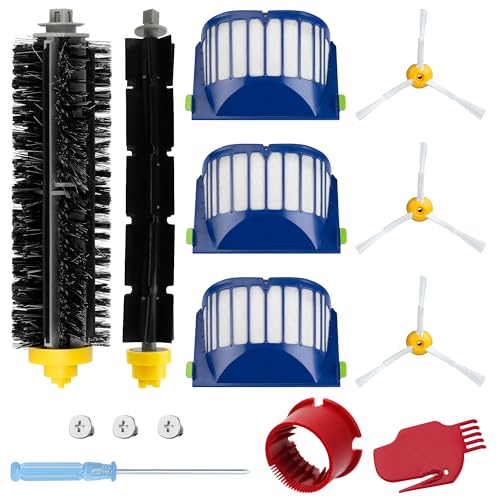
Affordable third-party replacement kit
YOKYON 600 Series Replacement Kit

Comprehensive kit for 600 series models
- Empty the Dustbin: To prevent overflow and maintain suction, empty the Roomba’s dustbin after each use.
- Keep Software Updated: Enable automatic software updates in the iRobot app to ensure your Roomba always has the latest features and bug fixes. You can also manually check for updates in the app’s settings.
Enhancing Navigation with a Virtual Wall
For users with complex home layouts, the Roomba Virtual Wall Lighthouse is a valuable accessory that enhances navigation. This device operates in two distinct modes.
- Lighthouse Mode: When placed in a doorway with the logo facing forward, it acts as a gatekeeper. It contains the Roomba within one room until it is thoroughly cleaned, then guides it to the next room. This ensures a systematic, room-by-room cleaning process and helps the Roomba find its way back to the Home Base afterward.
- Virtual Wall Mode: In this mode, the device creates an invisible barrier that the Roomba will not cross. This is perfect for blocking off areas with delicate furniture, pet bowls, or cluttered spaces you don’t want the vacuum to enter.
If you need to control where your Roomba cleans, a Virtual Wall can create invisible barriers to keep it out of specific rooms or areas, or guide it to clean one room at a time.
Roomba Virtual Wall
iRobot Dual Virtual Wall

Official iRobot replacement for precise room control
Avaenzo Virtual Wall

Budget-friendly dual mode barrier with indicator light
Coodss Virtual Wall

Wider compatibility with 500 series models
Garbage Fighter Virtual Wall

Affordable option with pet protection features
Frequently Asked Questions (FAQ)
How do I start my Roomba if there’s no on button on the wall unit?
You can start your Roomba using the iRobot Home app on your smartphone, a compatible physical remote control, voice commands via Amazon Alexa or Google Assistant, or by pressing the “CLEAN” button directly on the top of the robot itself.
What is the main function of the Roomba wall unit?
The wall unit, or Home Base, serves exclusively as a docking station and charging point. It is designed to automatically recharge the Roomba’s battery, ensuring it is always ready for the next cleaning job. It does not have any controls for activating the robot.
My Roomba isn’t connecting to the app. What should I do?
First, check that your home Wi-Fi is working correctly. Then, make sure your iRobot Home app and the Roomba’s firmware are both up to date. As a final step, try restarting your Roomba, your Wi-Fi router, and your mobile phone to resolve any temporary connection errors.
What does the Virtual Wall Lighthouse accessory do?
This accessory helps manage your Roomba’s cleaning path. In “Lighthouse” mode, it guides the Roomba to clean one room completely before moving to the next. In “Virtual Wall” mode, it creates an invisible barrier to prevent the Roomba from entering restricted areas.
Conclusion
The absence of an “on” button on your Roomba’s wall unit is a deliberate feature, not a flaw. It reflects iRobot’s commitment to an automated, simple, and intuitive cleaning experience. The Home Base is engineered to be a self-sufficient charging dock, while control is placed in your hands through more advanced methods like the iRobot Home app and voice assistants. By embracing these remote features and performing regular maintenance, you can ensure your Roomba operates at peak efficiency. Should you run into trouble, a systematic approach to troubleshooting can quickly resolve most common activation problems, getting your robotic helper back to work keeping your floors clean.
